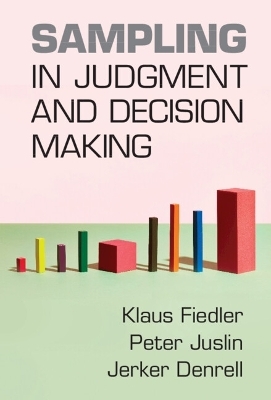
Sampling in Judgment and Decision Making
Cambridge University Press (Verlag)
978-1-009-00986-7 (ISBN)
Sampling approaches to judgment and decision making are distinct from traditional accounts in psychology and neuroscience. While these traditional accounts focus on limitations of the human mind as a major source of bounded rationality, the sampling approach originates in a broader cognitive-ecological perspective. It starts from the fundamental assumption that in order to understand intra-psychic cognitive processes one first has to understand the distributions of, and the biases built into, the environmental information that provides input to all cognitive processes. Both the biases and restriction, but also the assets and capacities, of the human mind often reflect, to a considerable degree, the irrational and rational features of the information environment and its manifestations in the literature, the Internet, and collective memory. Sampling approaches to judgment and decision making constitute a prime example of theory-driven research that promises to help behavioral scientists cope with the challenges of replicability and practical usefulness.
Klaus Fiedler is a Full Professor at Heidelberg University, Germany. He is a member of the German National Academy of Sciences Leopoldina, and a recipient of several science awards. Currently, he is Chief Editor of Perspectives on Psychological Science. His recent research has concentrated on judgment and decision making from a cognitive-ecological perspective. Peter Juslin is Professor of Psychology at Uppsala University, Sweden, and a member of the Royal Swedish Academy of Sciences. His research primarily concerns judgment and decision making. He has published extensively in prominent psychology journals on topics related to subjective probability judgment, overconfidence, multiple-cue judgment, and risky decision making. Jerker Denrell is Professor of Behavioral Science at Warwick Business School, University of Warwick, UK. He previously held positions at University of Oxford, UK and Stanford University, USA. His work focuses on how the biased experiences available to people lead to systematic biases in choices and judgment. He has published numerous articles in Science, PNAS, and Psychological Review.
1. The theoretical beauty and fertility of sampling approaches: a historical and meta-theoretical review Klaus Fiedler, Peter Juslin and Jerker Denrell; 2. Homo ordinalus and sampling models: the past, present, and future decision by sampling Gordon D. A. Brown and Lukasz Walasek; 3. In decisions from experience what you see is up to your sampling of the world Timothy J. Pleskac and Ralph Hertwig; 4. The hot stove effect Jerker Denrell and Gaël Le Mens; 5. The J/DM separation paradox and the reliance on small samples hypothesis Ido Erev and Ori Plonsky; 6. Sampling as preparedness in evaluative learning Mandy Hütter and Zachary Adolph Niese; 7. The dog that didn't bark: Bayesian approaches to reasoning Brett K. Hayes, Saoirse Connor Desai, Keith Ransom and Charles Kemp; 8. Unpacking intuitive and analytica memory sampling in multiple-cue judgment August Collsiöö, Joakim Sundh and Peter Juslin; 9. Biased preferences through exploitation Chris Harris and Ruud Custers; 10. Evaluative consequences of sampling distinct information Hans Alves, Alex Koch, and Christian Unkelbach; 11. Information sampling in contingency learning: sampling strategies and their consequences for (pseudo-)contingency Franziska M. Bott and Thorsten Meiser; 12. The collective hot stove effect Gaël Le Mens, Balázs Kovác, Judith Avrahami, and Yaakov Kareev; 13. Sequential decisions from sampling: inductive generation of stopping decisions using instance-based learning theory Cleotilde Gonzales and Palvi Aggarwal; 14. Thurstonian uncertainty in self-determined judgment and decision making Johannes Prager, Klaus Fiedler, and Linda McCaughey; 15. The information cost-benefit trade-off as a sampling problem in information search Linda McCaughey, Johannes Prager, and Klaus Fiedler; 16. Heuristic social sampling Thorsten Pachur and Christin Schulze; 17. Social sampling for judgments and predictions of societal trends Henrik Olsson, Mirta Galesic and Wändi Bruine de Bruin; 18. Group-motivated sampling: from skewed experiences to biased evaluations Yrian Derreumaux, Robin Bergh, Marcus Lindskog and Brent Hughes; 19. Opinion homogenization and polarization: three sampling models Elizaveta Konovalova and Gaël Le Mens; 20. An introduction to psychologically plausible sampling schemes for approximating Bayesian inference Jian-Qiao Zhu, Nick Chater, Pablo León-Villagrá, Jake Spicer, Joakim Sundh and Adam Sanborn; 21. Approximating Bayesian inference through internal sampling Joakim Sundh, Adam Sanborn, Jian-Qiao Zhu, Jake Spicer, Pablo León-Villagrá and Nick Chater; 22. Sampling data, beliefs, and actions Erik Brockbank, Cameron Holdaway, Daniel Acosta-Kane, and Edward Vul.
| Erscheinungsdatum | 03.04.2023 |
|---|---|
| Zusatzinfo | Worked examples or Exercises |
| Verlagsort | Cambridge |
| Sprache | englisch |
| Maße | 152 x 229 mm |
| Gewicht | 816 g |
| Themenwelt | Geisteswissenschaften ► Psychologie ► Allgemeine Psychologie |
| Geisteswissenschaften ► Psychologie ► Verhaltenstherapie | |
| ISBN-10 | 1-009-00986-9 / 1009009869 |
| ISBN-13 | 978-1-009-00986-7 / 9781009009867 |
| Zustand | Neuware |
| Informationen gemäß Produktsicherheitsverordnung (GPSR) | |
| Haben Sie eine Frage zum Produkt? |
aus dem Bereich


